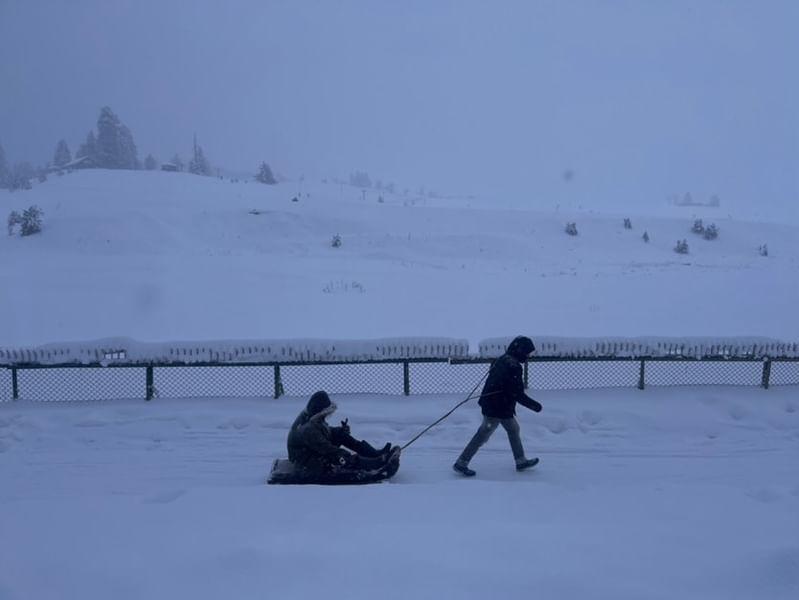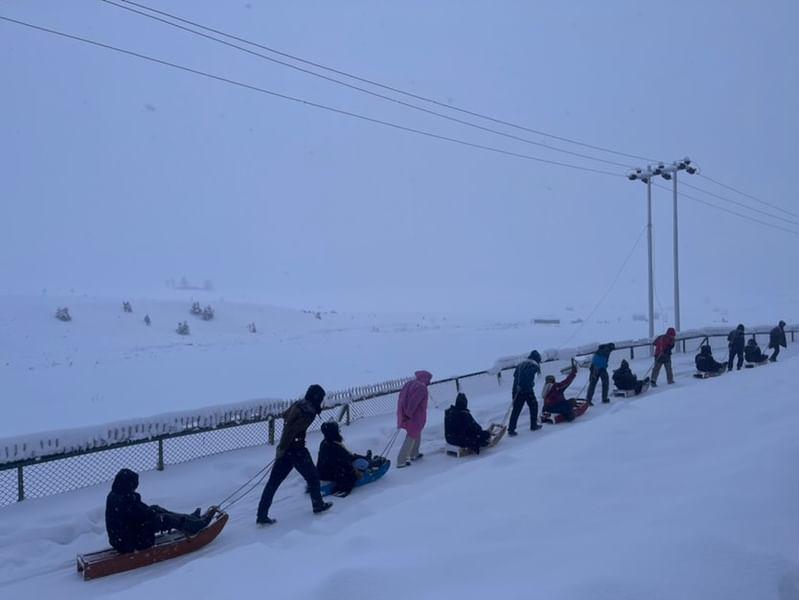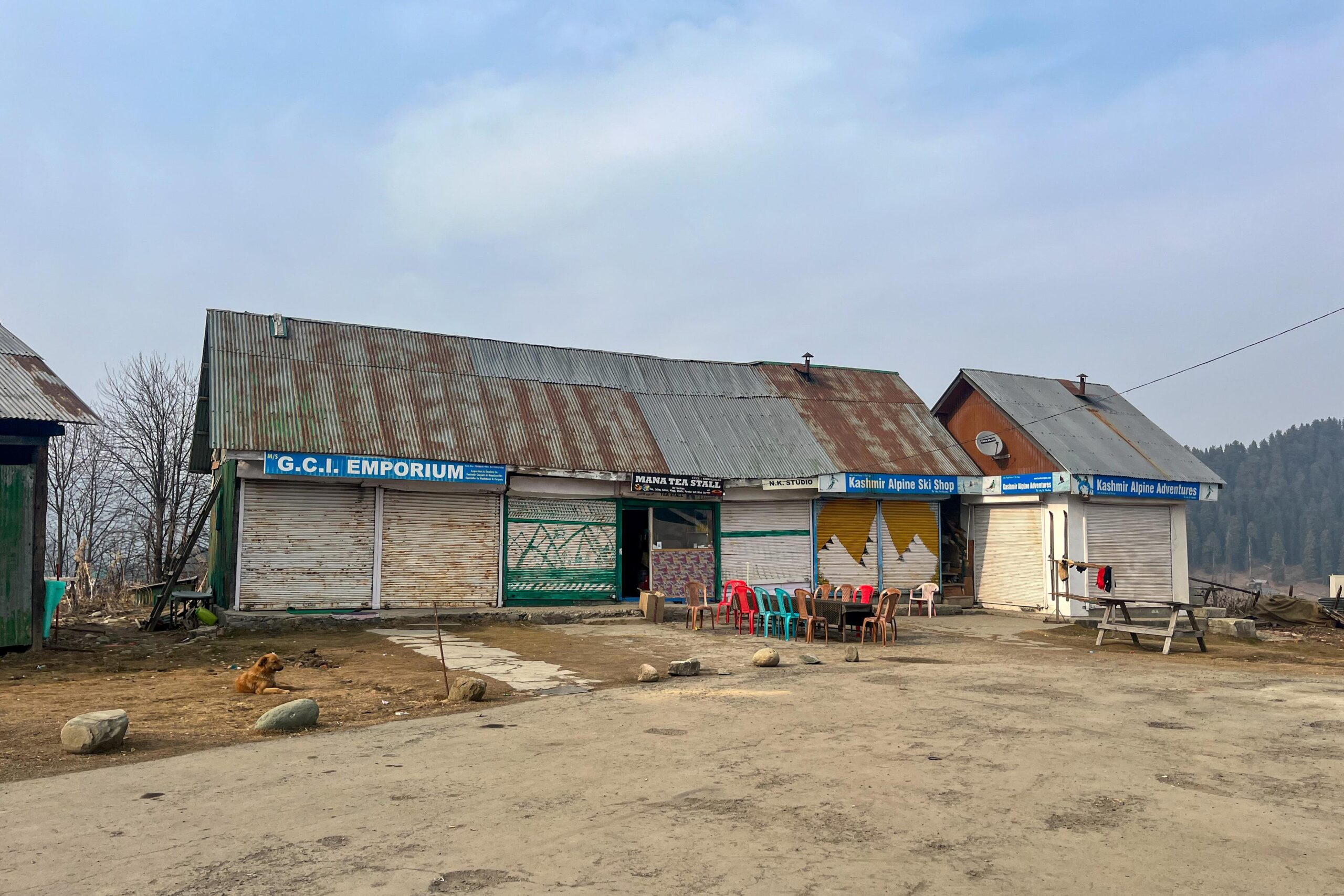'God Has Finally Answered Our Prayers': Fresh Snowfall Revives Dying Business in Kashmir

Irshad Hussain / Mubashir Naik , TwoCircles.net
After a months-long dry spell, the Kashmir valley finally received the much-anticipated first snowfall of the season in both the upper and lower elevations. The snowless winter hampered winter tourism and farmers and interrupted winter sports activity. The delayed snowfall harmed Kashmir's key economic sectors, leaving thousands of people involved in winter sports and tourism without jobs.
The fresh snowfall has not only revived the business community's failed hopes, but hundreds of skiers have resumed their skiing talents on the Gulmarg slopes.
'God Has Finally Answered Our Prayers'
Waseem Bhat, 26, a national ski player, waited almost three months for the first snowfall before beginning his training. With the first snowfall of the season, Bhat is preparing to demonstrate his skills in upcoming winter sports in front of national and international audiences.

"I never expected climate change to jeopardize our professional careers. More than 4000 skiers were affected by the dry spell. Three months of waiting for the season's first snowfall had taken its toll on our mental health. "It feels like God has finally answered our prayers," said Bhat, adding that thousands of skiers had flocked to Gulmarg following recent snowfall.
The tourism business in Jammu and Kashmir generates approximately Rs. 8,000 crores per year, accounting for 7 to 8% of the state's GDP. This industry employs approximately 70,000 people, both directly and indirectly.
Thousands of hoteliers and others in the tourism and travel industry have been impacted in the last two months as tourists canceled their vacations.
Abdul Rashid Magray, 48, has been giving sledge rides to tourists in Gulmarg for the past 30 years. Magray used to earn over INR 30,000 per month during the winter months.
Magray's family relies on his sledge business, which, like many others, was impacted. "My son's education got affected as I couldn't afford the fees to send him for winter tuition. I was anxiously awaiting the snowfall. With the arrival of fresh snowfall, I resumed my business in Gulmarg and sent my son to tuition," Magray told Two Circles.
[caption id="attachment_449507" align="aligncenter" width="799"] Sledge business picks up in Gulmarg after snowfall. Photo credit: Syed Sharyar, TwoCircles.net[/caption]
Sledge business picks up in Gulmarg after snowfall. Photo credit: Syed Sharyar, TwoCircles.net[/caption]
Dashed Hopes Revived
After failing to find work in the government sector, Mudasir Ahmed, 32, of Tangmarg, Baramulla, built a hotel in Gulmarg 11 years ago to support his six family members. His business grew over the years, but this winter, only 10 of his hotel's 35 rooms were booked. Ahmed suffered a loss of lakhs.
On January 29, when the Meteorological Department predicted snowfall in upper regions like Gulmarg and Pahalgam, Mudasir headed for Gulmarg to see the season's first snowfall. His eyes welled up with tears when he saw the fresh snowfall.
"Our business has taken on a new life. We don't have hotel occupancy right now," Ahmed explained.
Gulmarg was the first ski destination established by the British in 1927, offering skiing and snowboarding on its slopes. During the winter of 2022, about 15.5 lakh international and national tourists and skiers visited Gulmarg. In January 2023, 95,989 people, including 547 foreigners, visited Gulmarg.
Declining Winter Snow Puts Livelihoods Dependent on Water Sources at Risk
According to Shakil Ahmad Romshoo, scientist and vice-chancellor of the Islamic University of Science and Technology in Kashmir, winter snowfall in Kashmir has been steadily declining over the last few decades, owing mostly to rising temperatures. Shakeel expressed fear that if the dry period continued, water levels in Kashmir's water bodies would be reduced during the summer. "This puts at risk those whose livelihoods depend on these water resources as well," he added.
While speaking with Two Circles, Manzoor Ahmad Pakhtoon, President of the Kashmir Houseboat Industry, stated that visitors cancelled houseboat bookings owing to low water levels in the lakes and rivers, but that with the coming of fresh snowfall, the houseboat business has begun to thrive once again.
[caption id="attachment_449508" align="aligncenter" width="2560"] Due to absence of snow, shops remained closed : Umer Farooq.[/caption]
Due to absence of snow, shops remained closed : Umer Farooq.[/caption]
Mukhtar Ahmed, Director of the Srinagar Meteorological Department, told Two Circles that the protracted dry weather has an impact on Kashmir's agriculture sector, which accounts for 70% of people' livelihoods.
The latest snowfall marks a significant shift from the snow drought that occurred earlier this winter, raising concerns about the local ecosystem and livelihoods. Jammu & Kashmir is regarded as an eco-fragile zone, already facing environmental challenges as a result of urbanisation, deforestation, and water resource depletion.
Irshad Hussain and Mubashir Naik are independent journalists based in Kashmir.
